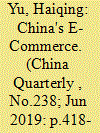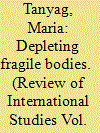| Srl | Item |
| 1 |
ID:
166874


|
|
|
|
|
| Summary/Abstract |
This article employs a feminist political economy perspective to explore the connection between e-commerce, entrepreneurship and gender in rural China. It discusses gendered engagement with, and discourses of, the new digital economy represented by Taobao villages, and asks: how has the success of rural e-commerce impacted the evolving gender mandate and hierarchy in a competitive market economy in rural China? Has rural women's participation in digital economic activities changed their gendered roles and the patriarchal structure in their family and village? This article argues that women's socioeconomic enablement does not necessarily translate into cultural and political empowerment. The enabling potential of female entrepreneurship is tempered by traditional constraints on women and digital capitalist exploitation of their cheap, flexible and docile labour.
|
|
|
|
|
|
|
|
|
|
|
|
|
|
|
|
| 2 |
ID:
160882


|
|
|
|
|
| Summary/Abstract |
In a crisis-prone world, the number of internally displaced persons (IDPs) uprooted by both armed conflicts and environmental disasters has drastically increased and displacement risks have intensified. Despite the growing attention within global security and development agendas to sexual and reproductive health and rights (SRHR), there remain striking gaps in addressing SRHR in crisis situations, particularly among IDP women and girls. This article examines the continuum between social reproduction in times of crisis and the material and ideological conditions that restrict women’s bodily autonomy in everyday life. Using the case of the Philippines where millions of people are routinely affected by conflict and disaster-induced displacements, it argues that the failure to recognise the centrality of women’s health and bodily autonomy not only hinders the sustainable provision of care and domestic labour during and after crisis, but also fundamentally constrains how security is enacted within these spaces. Thus, the article highlights an urgent need to rethink the gendered political economy of crisis responses as a building block for stemming gendered violence and depletion of social reproductive labour at the household, state, and global levels.
|
|
|
|
|
|
|
|
|
|
|
|
|
|
|
|